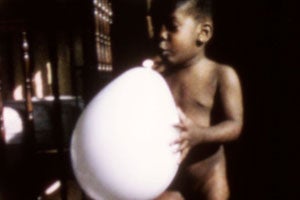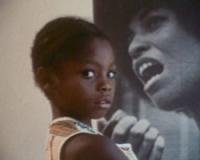For me, there is always a need to latch on to the familiar when I am watching or thinking about experimental film that, in truth, seems a counterintuitive approach because experimental film asks that we look outside of our realm of influence and endeavor to create meaning from the unfamiliar. Medea, a Project One film from Ben Caldwell, presents a history that I can’t hope to know in its entirety, but can attempt to make sense of through the dense imagery Caldwell poetically situates in our minds.

To me, the most powerful aspect of the piece was the onslaught of still images. They came at you fast and unforgiving in their content. They weren’t the kind of pictures you’d find in a high school history text, embedded in the solitary chapter dedicated to racism and slavery in America; or the kind of images you’d find in the news, sensationalized and oversimplified. These images felt real in way antithetical to the way images are presented to us in mainstream media. They flashed onto the screen one-by-one, layered and dense in content and meaning, mediated only through the voice-over narration which served to strengthen those images, making the montage a much more potent experience. To me, it felt in a sense like an ephemeral memorial to Black cultural history, a flash of historical meaning to learn from and carry with you that threatens to fade over time. Medea is a shock to the system, and one I won’t soon forget.
In his oral history, Ben Caldwell reflects on his photographic montage, likening its format to “a history of art in ten seconds” and its content to “the birth of a young woman in those first few minutes.” He describes the photographic montage as being a flash of history imbued upon a newborn child, the intensity and pacing of the images working in tandem with the process of birth. This metaphor works really well for my own experience with Medea. Directly after the screening of that first film, I suddenly felt thrust back out into the world with a new set of visual experiences to draw from that I didn’t understand fully, and I still don’t, but isn’t that how we all started?
—Rachel Wilson
Emancipating the Image
Ben Caldwell’s Medea is visual poetry that emancipates the image. Those are Ben Caldwell's words, not mine, as much as I would like to take credit for them. Caldwell conceived each frame as a word of poetry, where no one word is more or less powerful than another. He questioned how the individual would see each frame, and how each frame changed in relationship to the next. Heady material for a beginning filmmaker at UCLA in the 1970s, though Caldwell was a photographer before turning to filmmaking.
“I saw plenty of movies and I think how it impressed my life as a filmmaker was that it made me an experimental filmmaker because I had gotten to see films over and over again. The whole idea of the talking heads really didn’t engage me. Dealing with film as a picture medium and having each picture be worth a thousand words engaged me.”
Much like the young protagonist in Cinema Paradiso, Caldwell spent a great deal of his youth in a projection booth with his grandfather and those years profoundly influenced in life.
“My grandpa used to babysit me, so I was four years old when I first remember the first arc and projection booth and I would help him change reels.” His grandfather taught him to watch for the star, the cross and the hole, and yell out when he saw them. “So, that was kind of like my gig to stay focused because I would watch the movie intently until that happened.”
That attention blossomed into strong opinions and clear insight into the way white filmmakers perpetuated the destruction of culture.
“I noticed that a lot of those subliminal images were threaded throughout films in the history of filmmaking and all those things were to the demise of my culture,” Caldwell explains, “It was like ‘jiggaboos’ and funny things and subtle implications of who we are and that's because we were conquered and the conqueror was the one that was showing these films. ”
While Medea thoughtfully shows the messages that permeate an unborn child's psyche via his or her parents, and thereby programs a culture, it's Caldwell's careful audio selection that drives his point home in seven very short minutes.
“I also had Amiri Baraka's poem called “Raise the Dead” [N.B. “Part of the Doctrine”] […] and I use that as a chant.”
It's interesting to consider how those pictures and audio would be different for a culture not created from slavery?
All quotes attributed to the L.A. Rebellion Oral Histories, June 14, 2010 Ben Caldwell.
—Dawn Spinella






 Mobile Navigation
Mobile Navigation

